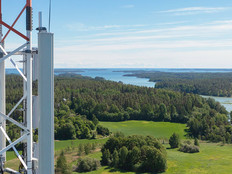What FirstNet Means for Federal Emergency Responders
Federal first responders, including police, fire and emergency medical workers stationed at military bases, will benefit from a nationwide broadband network dedicated to public safety.
TJ Kennedy, general manager for the First Responder Network Authority (FirstNet), said he’s seeing a lot of federal involvement in FirstNet in the western part of the country, where there’s a high concentration of federal firefighters, and agencies are tightly knitted into the local environment.
FirstNet has received inquiries from those entities, including calls from the Fort Carson Fire Department, in Colorado, about joining local FirstNet initiatives, Kennedy said at the fourth annual Mobile Technology Summit, hosted by AFCEA Washington, D.C., last week.
Kennedy’s organization now has a full-time federal consultation lead who interacts with agencies. FirstNet is also taking advantage of existing channels for collaboration, such as the Department of Homeland Security’s Emergency Communications Preparedness Center (ECPC). The ECPC comprises 14 agencies that have a broad role in emergency communications regulation, policy, operations, grants and technical assistance, according to the center’s website.
When asked whether there were classified components of the network, Kennedy said FirstNet is working with agencies that desire different levels of security. For example, first responders may need to share medical records over the network.
Kennedy also stressed the importance of building a robust and secure network that public-safety employees can access with ease.
“We cannot have a network that is so secure all of the time for everyone that they can’t access it,” he explained.
FirstNet Funding and Fees
FirstNet will serve emergency responders across the country at the federal, state and local levels. Development and sustainment of the network will come from user fees, spectrum auctions and leasing agreements, with those outside the public-safety community to pay for and use the network’s excess capacity.
“The key to making it (user fees) low is keeping cost down in building and keeping operational capabilities and leveraging of excess capacity of [the] network up, Kennedy said.
A major incentive for keeping costs low is to attract public-safety organizations to opt into using FirstNet; they are not required to use the network.
The 2012 law that established FirstNet allotted $7 billion for the initiative through Federal Communications Commission spectrum auction revenues. Based on recent auctions, it appears likely that FirstNet will receive the $7 billion in funding.
Learn how your agency can participate in FirstNet.









